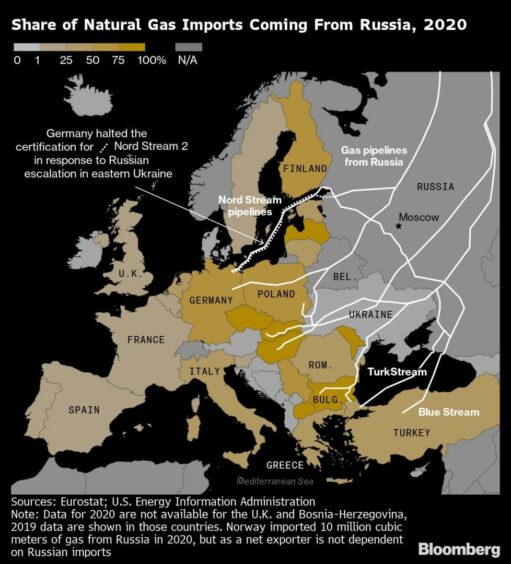
Germany pledged new support for liquefied natural gas (LNG) terminals, the latest sign it’s willing to retool its energy policy in the wake of Russia’s invasion of Ukraine.
Just days after shelving an $11 billion pipeline project to bring Russian gas to Europe, Chancellor Olaf Scholz said Germany would move “quickly” to build two LNG terminals. So far proposed projects have been left to the private sector alone, and are facing headwinds without government support.
“The events of the last few days and weeks have shown us that a responsible, forward-looking energy policy is not only crucial for our economy and our climate. But also crucial for our security,” Scholz told the parliament in Berlin on Sunday. “We will change course in order to overcome our import dependency on individual energy suppliers.”

The move — announced as Scholz said he would also bolster defence spending in a dramatic step-change for Germany — signals that Europe sees the invasion of Ukraine as a turning point and wants to finally address its longstanding addiction to Russian gas. Germany relies on Russia for more than half its natural gas, and a decision to phase out nuclear power before enough renewable capacity has been built to replace it has left the country particularly vulnerable.
Berlin is also bolstering gas and coal storage, and Scholz said the government would push for a faster rollout of renewables too.
He didn’t give details of the plan for the LNG plants, but last week the government said it was considering financial support and incentives to drive interest from investors and potential clients.
Until now, wild price swing and strict rules have deterred potential clients and investors, and the industry has been asking for help. The energy transition and the fight against climate change also raise the risk that new projects will end up as stranded assets, putting off investors.
While several countries are talking up the need to accelerate renewable investments to wean off Russian gas, some of the alternatives being proposed will be even more damaging to the environment. Italy said last week it may re-open coal mines as part of its plan to reduce its dependence on Moscow — which has even grown in the last decade.
Recommended for you
